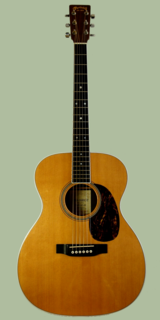
The term jazz guitar may refer to either a type of guitar or to the variety of guitar playing styles used in the various genres which are commonly termed "jazz". The jazz-type guitar was born as a result of using electric amplification to increase the volume of conventional acoustic guitars.

The Gibson L-5 guitar was first produced in 1922 by the Gibson Guitar Corporation, then of Kalamazoo, Michigan, under the direction of acoustical engineer and designer Lloyd Loar, and has been in production ever since. It was considered the premier guitar of the company during the big band era. It was originally offered as an acoustic instrument, with electric models not made available until the 1940s.

Epiphone is an American musical instrument manufacturer founded in 1873 by Anastasios Stathopoulos, currently based in Nashville, Tennessee. In 1957 Epiphone, Inc., of New York City was purchased by Chicago Musical Instrument Co. and given the name Epiphone, Inc. of Kalamazoo, Michigan. CMI took great measures to keep the Gibson and Epiphone identities separate and housed the two companies in different buildings each with its own separate management team. Epiphone was Gibson's main rival in the archtop market prior to 1957. Their professional archtops, including the Emperor, Deluxe, Broadway and Triumph, rivaled those of Gibson. Aside from guitars, Epiphone also made double basses, banjos, and other string instruments. However, the company's weakness in the aftermath of World War II and death of Epaminondas Stathopoulos in 1943 allowed Gibson's parent, CMI, to purchase it.
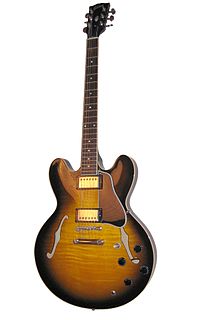
A semi-acoustic guitar or hollow-body electric is a type of electric guitar that originates from the 1930s. It has both a sound box and one or more electric pickups. This is not the same as an acoustic-electric guitar, which is an acoustic guitar with the addition of pickups or other means of amplification, added by either the manufacturer or the player.

An "archtop guitar" is a hollow steel-stringed acoustic or semiacoustic guitar with a full body and a distinctive arched top, whose sound is particularly popular with jazz, blues, rockabilly, and psychobilly guitarists.
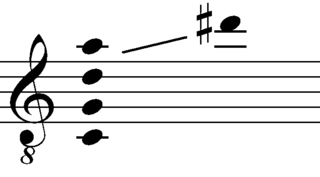
The tenor guitar or four-string guitar is a slightly smaller, four-string relative of the steel-string acoustic guitar or electric guitar. The instrument was initially developed in its acoustic form by Gibson Guitar Company and C. F. Martin & Company so that players of the four-string tenor banjo could double on guitar.
A sound hole is an opening in the body of a stringed musical instrument, usually the upper sound board.
Sound holes have different shapes:

The Gibson ES-125 is an archtop, hollow body electric guitar model that was produced by the Gibson Guitar Corporation.

The Gibson ES-175 is an electric guitar manufactured by the Gibson Guitar Corporation. It was dropped from the Gibson lineup for 2019 after 68 years in continuous production. It is a 243⁄4" scale full hollow-body guitar with a trapeze tailpiece and Tune-O-Matic bridge. It is one of the most famous jazz guitars in history.

The Byrdland is an electric guitar made by Gibson. Its name derives from the names of guitarists Billy Byrd and Hank Garland for whom Gibson originally custom-built the guitar.
The Gibson ES series of semi-acoustic guitar are manufactured by the Gibson Guitar Corporation. The letters ES stand for Electric Spanish, to distinguish them from Hawaiian-style guitars which were played flat on the lap. Many of the original numbers referred to the price, in dollars, of the model. Suffixes in the names indicate additional appointments, for example "T" means "thinline" while "D" means "double pickup". Many of the models came with f-holes, though some, such as B.B. King's signature Lucille series, were made without f-holes. Some models were full-bodied models, while single- and double-cutaways are also available. Two different styles of cutaways were used, both named by Gibson after Italian cities. Florentine models had a sharper, more pointed end on the cutaway, while more rounded and contoured cutaways were called Venetian style.
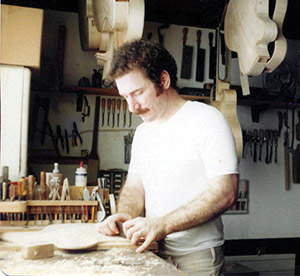
Robert Benedetto is an American luthier of archtop jazz guitars. In 1968, he made his first archtop guitar in New Jersey and has handcrafted nearly 850 musical instruments. His guitars appear on many recordings, videos, and TV and film soundtracks, and have been featured in books, magazines and museums.
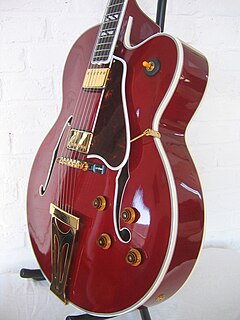
The Gibson Super 400 is an archtop guitar. It is a highly influential guitar model that inspired many other master guitar builders. It was first sold in 1934 and named for its $400 price, like many Gibson guitars of that era.
The Gibson ES-100 is an archtop electric guitar produced from 1938 to 1941 by Gibson. It was re-introduced as the Gibson ES-125 in 1946.
The Gibson Citation was a top-of-the-line archtop guitar, introduced in 1969 by Gibson and still available from the Gibson Custom Shop on special order. It had a 17" full-depth body with figured maple back and sides and a carved maple or spruce top with fancy inlays. The neck was made of figured maple or mahogany.
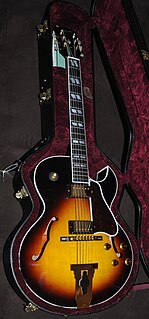
Gibson L-4 refers to several archtop guitars produced by the Gibson Guitar Corporation.
Mississippi Delta bluesman Robert Johnson has been called the "King of the Delta Blues Singers", the "Grandfather of Rock and Roll" and "the most important blues singer that ever lived". The guitars he played, recorded and was photographed with have always been a curiosity to blues researchers and musicologists, and this interest eventually led to the production of guitars dedicated to his memory.

Collings Guitars is an Austin, Texas based stringed instrument manufacturer. The company was founded in 1973 by Bill Collings who was "one of the most recognized and respected names amongst aficionados of modern acoustic instruments." Their acoustic guitars have been highly regarded for decades. In addition to acoustic guitars they also make electric guitars, archtop guitars, mandolins, and ukuleles.

The Gibson L-1 is an acoustic guitar that was first sold by the Gibson Guitar Corporation in the early 20th century.
The L-1 model was introduced first as an archtop (1902), and later as a flat top in 1926.
The model is famously associated with the legendary bluesman Robert Johnson.

William Lewis "Billy" Byrd was a key early country lead guitarist and studio musician who performed with Ernest Tubb, the Oak Ridge Quartet, Tex Ritter, George Hamilton IV, Jimmy Dickens and others. He helped to popularize the role of the electric lead guitarist in country music and, with fellow guitarist Hank Garland, was responsible for input into the design of the Gibson Byrdland guitar, named after parts of the names of both players.
